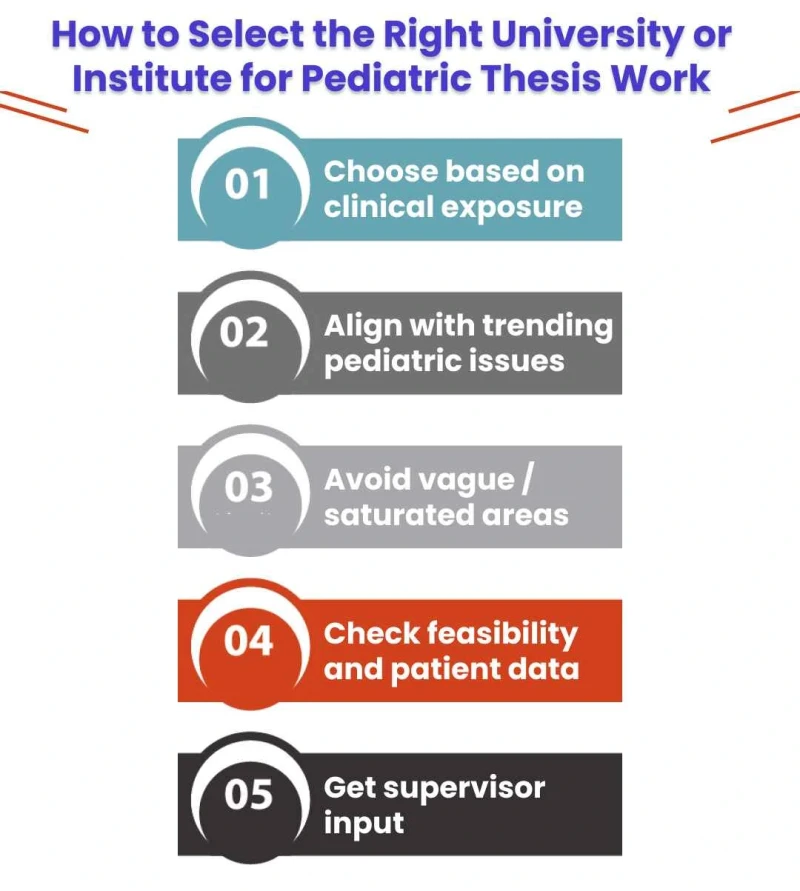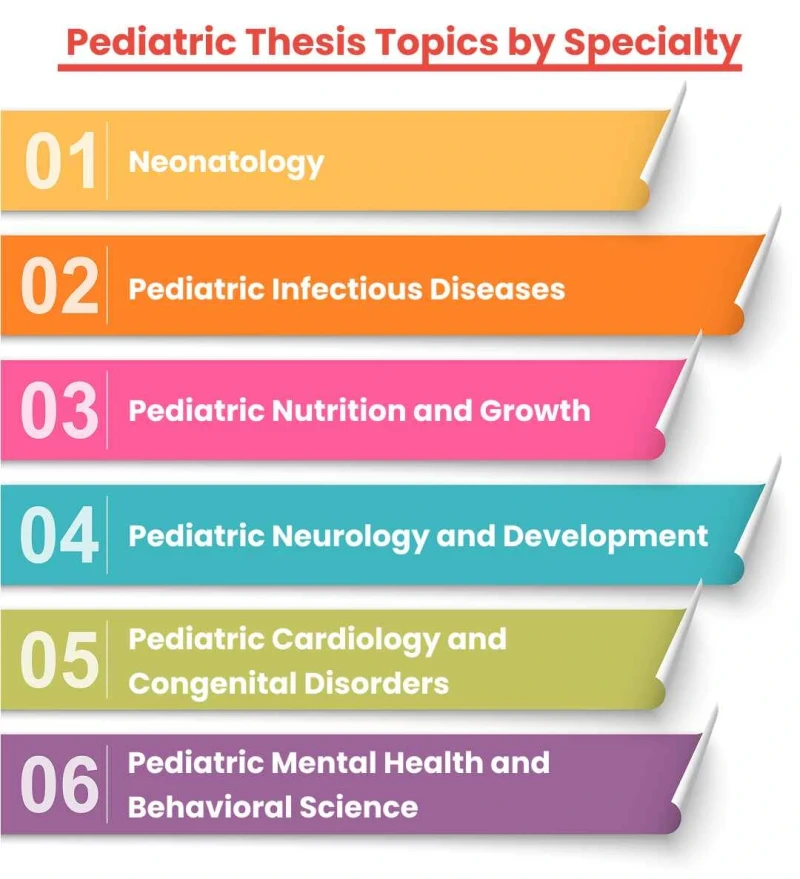Methods of Primary Data Collection in Research Methodology
Master the top methods of primary data collection in research methodology. Learn to use surveys, interviews, and experiments to gather original, high-quality data.

Reena Martin .K
Pediatrics is a specialized medical stream that deals with the medical care of children, adolescents, and infants. Pediatrics has a very important role to play in the healthy development of future generations. For postgraduate medical students, thesis writing in pediatrics is not only a degree requirement but an opportunity to engage with real-life clinical issues and provide valuable contributions to the field of child healthcare.
Yet, choosing thesis topics in pediatrics can be daunting. Students are usually torn between clinically oriented themes and the feasibility of research. Most find it difficult to find a balance between interest, novelty, and practicability. This blog is intended to lighten that burden by providing a classified list of high-impact, trending thesis topics in pediatrics that can direct your scholarly journey as well as later clinical practice.
Your thesis title is the cornerstone of your entire research project. Choosing the appropriate topic not only defines your learning process but also determines your availability of cases, approval schedules, and the feasibility of conducting research in general. While choosing thesis topics in pediatrics, the clinician has to keep in mind the patient data availability, clearance on ethical grounds, and applicability to present-day clinical practice.
Ineffective choice of topics may result in delay, rejection, or lack of significant outcomes. Alternatively, a good topic can broaden your appreciation of pediatric care and lead to specialization in the future. Effective pediatrics thesis topics must harmonize with changing healthcare demands, institutional agendas, and your clinical interests.
Select thesis topics in pediatrics based on patient cases you've experienced during postings. Familiarity aids understanding, the collection of data, and handling real-time research complexities.
Select thesis topics in pediatrics corresponding to emerging public health issues such as antibiotic resistance, childhood obesity, or vaccine uptake to make them pertinent and have a greater research impact.
Do not select overused or ambiguous subject matter. Redundant or uninspired thesis subjects in pediatrics can result in poor outcomes and fewer academic merits.
Make sure patient load, follow-up, and diagnostic availability are present before locking in thesis subjects in pediatrics to assist with easy data analysis and collection.
Discuss possible thesis topics in pediatrics with your advisor to confirm alignment with institutional priorities and seek feedback on what will work best for your academic level.

A reputable institute can both make or break your research career. While choosing where to pursue your thesis topics in pediatrics, focus on institutions with high patient turnover and a strong pediatric department. Opt for faculty with research orientation and facilities for NICU, PICU, and specialty OPD/IPD services.
Better institutes also provide superior support in terms of research ethics clearance, statistical analysis, and funding. Explore the academic culture of the university—does it facilitate student research, provide access to journals, and deliver mentorship? These will have a large impact on the quality of your pediatrics thesis topics and overall research experience.

Following is a detailed list of pediatrics thesis topics divided by specialty to allow you to choose according to relevance and interest.
Neonatology is concerned with the medical treatment of newborns, especially those who are preterm, low birth weight, or critically sick. It is a fast-developing specialty with continuous improvements in neonatal intensive care and survival rates.
Outcome of preterm infants treated with non-invasive ventilation
Retinopathy of prematurity: Risk factors and outcomes
Neonatal sepsis: Clinical profile and antimicrobial resistance trends
Congenital hypothyroidism screening in newborns
Effects of kangaroo mother care on low birth weight infants' weight gain
This area deals with infections that are unique to, or more severe in, children. Research here goes into improving prevention, diagnosis, and treatment guidelines for pediatric populations.
Clinical profile and complications of dengue among pediatric patients
Pediatric urinary tract infections: Antimicrobial resistance
Effects of rotavirus vaccination on the incidence of diarrheal illness
Tuberculosis in children: Diagnosis challenges and outcomes
Seroprevalence of hepatitis B among school children
This area delves into the role of nutrition in the growth, development, and prevention of disease among children. It embraces both undernutrition and overnutrition-associated issues.
Effect of complementary feeding patterns on infant development
Nutritional status and anemia prevalence among school children
Probiotics for pediatric gastroenterological conditions
Analysis of BMI trends among urban compared to rural children
Micronutrient deficiency and cognitive function of toddlers
This area deals with neurological and developmental disorders in children, such as epilepsy, cerebral palsy, and developmental delay. Early diagnosis and intervention are the key research issues.
Pediatric epilepsy: Treatment outcomes and seizure types
Cerebral palsy: Comorbidities and risk factors
Headache disorders among school-age children
Developmental delay: Etiological and clinical assessment
This specialty explores heart disease and congenital defects that exist at birth. Study sometimes includes diagnosis, prognosis, and results of interventional or surgical treatment.
Ventricular septal defects: Prevalence and outcomes
Congenital heart disease and genetic association in neonates
Pediatric rheumatic heart disease: Long-term results
Echocardiography use in early CHD diagnosis
Risk factors for pediatric hypertension
Childhood mental health is the foundation for a lifetime of well-being. This area addresses behavioral disorders, emotional health, and developmental psychopathology in children.
Screen time and behavioral issues among schoolchildren
ADHD: Diagnostic trends and response to treatment
Anxiety disorders in adolescents: A study in schools
Sleep disorders and academic learning
Emotional impact of chronic illness in children
Irrelevance to modern clinical practice makes your study less effective.
Sensitive topics like vaccine reluctance can pose moral issues if addressed in a wrong manner.
Follow-up diagnostics and patient records that are hard to access will damage your study.
Diffuse topic areas are hard to implement and defend upon evaluation.
Don't select topics lacking immediate clinical relevance or practice.
If you’re still unsure how to finalize your thesis topics in pediatrics, don’t worry—you’re not alone. Many students benefit from expert guidance to evaluate the practicality and academic value of their chosen subject.
We assist medical students in choosing appropriate pediatrics thesis topics, determining feasibility, matching them with clinical objectives, and obtaining ethical clearance. From uncertainty to clarity, our specialists walk you through topic choice, objective development, and literature backing—in a step-by-step fashion.
We have pediatric research mentors with clinical and academic experience who provide individualized feedback at every step to elevate your thesis topics in pediatrics.
We oversee topic selection, proposal drafting, methodology design, literature synthesis, data interpretation, and defense preparation, ensuring a cohesive and stress-free thesis experience.
We facilitate ethical approvals, patient registry access, and streamlined data collection processes, empowering robust research and accurate analysis for your thesis topics in pediatrics.
We carefully structure each portion in line with institutional requirements, citation formats, and submission guidelines to avoid technical editing and achieve the highest evaluation success.
We pledge to return drafts, revisions, and completed thesis papers well ahead of deadlines, leaving you sufficient time for review, feedback incorporation, and assured submission.
Selecting the appropriate thesis topics in pediatrics can determine your academic career and future area of specialization. With a good topic, proper supervision, and institutional facilitation, you can make meaningful contributions to child health and clinical practice. Make your thesis the beginning of making a difference in pediatric medicine.
Master the top methods of primary data collection in research methodology. Learn to use surveys, interviews, and experiments to gather original, high-quality data.
Don’t write your methodology without reading this. Learn why purposive sampling is essential for case studies and how to define your inclusion criteria. Url:purposive-sampling
Master the chapterization of thesis to ensure logical flow. Learn the standard academic framework for organizing research into a professional, approved document.
A practical guide to sentiment analysis research papers covering methodologies, datasets, evaluation metrics, research gaps, and publication strategies.
Master data analysis for research papers. Learn quantitative and qualitative methods, cleaning, and reporting standards to ensure your study meets journal rigour.
Want to impress your peers? Discover the best ways to condense your research, avoid common mistakes, and handle tough questions at any academic conference.